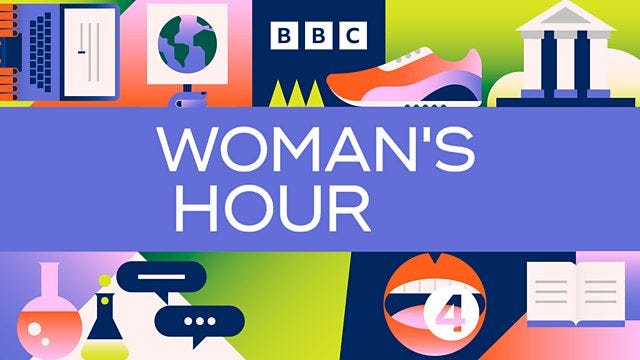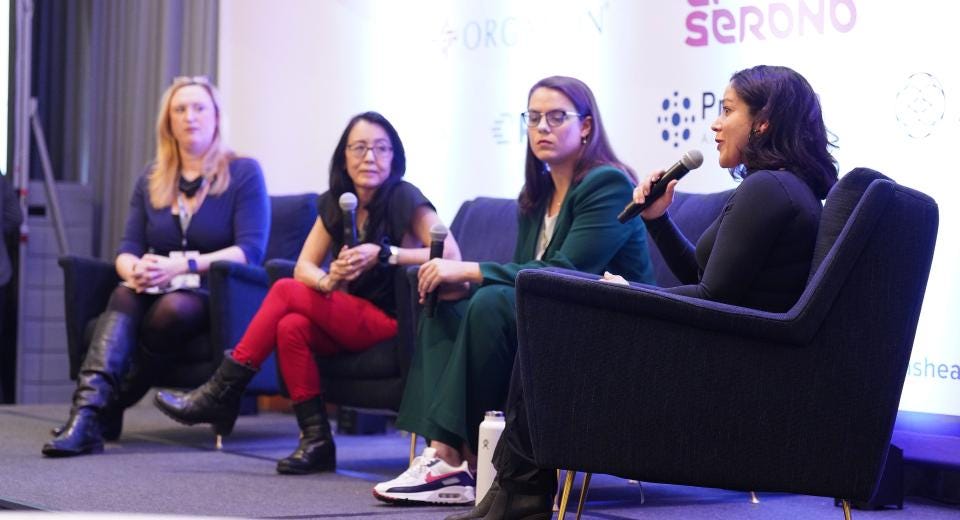Issue 11: Women of Science Feb '24
News, research, reviews, recommendations on all things women in science
Welcome back to Women of Science, featuring all the best happenings re: women of science 🧬
🔬 What to expect?
All subscribers receive the free edition covering highlights in media, awards and discovery as well as things to read, see and watch re: women in science. Drops alternate Tuesdays. Tell your friends:
Thank you for joining. Enjoy the read.
A quick run-down of this issue:
Abstract & Intro: News and updates on all things women of and in science
Materials, Methods, Discussion: Our research read of the week
Conclusions & Further Reading: Reads, interviews, podcasts, events & links this week Abstract & Intro
Headlines, news & media snippets re: women of science this week
📌 Healthcare: Lupus and Other Autoimmune Diseases Strike Far More Women Than Men. Now There’s a Clue Why
Women are far more likely than men to get autoimmune diseases, when an out-of-whack immune system attacks their own bodies — and new research from Stanford University may finally explain why.
📌 Healthcare: New generation of female entrepreneurs tackles women’s heart health
The Washington Post shines light on new generation of female entrepreneurs determined to address the shockingly common misdiagnoses and care delays that are among the reasons women are up to twice as likely to die of heart attacks as men.
📌 Healthcare: Ovaries are an enigma that could unlock human lifespan
Philanthropist Nicole Shanahan is spending $100mn to find answers to fundamental questions about ovaries.
📌 General STEM: International Day of Women and Girls in Science, 11 February
The UN marks Feb 11th as International Day of Women and Girls in Science - an annual reminder and an opportunity to promote full and equal access to and participation in science for women and girls. Read more about the work being done in 2024 above.
📌 Tech: Swifties stepped in to bury explicit Taylor Swift AI images as tech companies struggled to respond
The alarming episode shows how ill-prepared tech companies are to protect women and girls from deepfakes.
& in other brief news:
Materials, Methods, Discussion
Our research pick of the week, and why it’s important
Nature Medicine: What is the current state of digital health for aging populations?
Abstract: Growing life expectancy poses important societal challenges, placing an increasing burden on ever more strained health systems. Digital technologies offer tremendous potential for shifting from traditional medical routines to remote medicine and transforming our ability to manage health and independence in aging populations. In this Perspective, we summarize the current progress toward, and challenges and future opportunities of, harnessing digital technologies for effective geriatric care. Special attention is given to the role of wearables in assisting older adults to monitor their health and maintain independence at home. Challenges to the widespread future use of digital technologies in this population will be discussed, along with a vision for how such technologies will shape the future of healthy aging.
TL; DR - In this review, Chen et al. summarise current trends, challenges, and future potential of using digital technology for effective elderly care; namely the growing significance, use and impact of digital monitoring devices.
Why is this important?
Impact to healthcare from, and on, ageing populations: Growth of geriatric populations is outpacing society’s ability to meet their healthcare needs. Women live longer, but report greater impairment in their functional, physical, cognitive, and social abilities as well as for “active ageing”.
Integration of digital tech: Wearables can help to address and transform many aspects of geriatric care.
Digital literacy… influencing how older adults access care and interact with healthcare systems, and how misunderstanding and misuse can have negative consequences on physical and mental health.
Cost effectiveness: Mid- and low-income countries may be disadvantaged in adoption and access, whilst countries with health insurance systems may not yet be able to roll out widely to the public.
Conclusions & Further Reading
More links & signposts for you to enjoy this week…
Books & review articles:
📕 Book review: Celebrating the women who helped create modern science: Ghose profiles women scientists like the pioneering astronomers Annie Jump Cannon, Celia Payne, Margaret Burbidge, and Henrietta Leavitt.
🐱 Are 'Cougars' Happier? What Science Says About Women Who Date Younger Men: But this isn't the first study to find this outcome.
👩💻 Where are all the women in tech? While working as a software development project manager in Rio de Janeiro, Brazil, Bianca Trinkenreich was always one of few women in the room—and she often wondered why. Read about it here.
🔧 Women in Engineering: Stories from the trenches: If a woman can survive a tough engineering undergrad program, then the social stigma of working a first job with an all-male team can be a gut punch. This op-ed explores why.
💸 In search of funds and finance: Best practices from women life sciences leaders: Suzanne Filippi and Laurie Burlingame sit down with women leaders in the industry to talk about how best to secure funding, what developments in the industry they feel are important to watch, and advice for women in the space.
🌐 Women in science, not in silence: pioneering change in the global climate crisis: Climate emergencies are not gender neutral. In fact, the degradation of the planet’s natural systems has a disproportionate effect on women and girls. UNESCO shares this insight in their latest climate change publication.
📷 Passion, curiosity and perseverance: my mission to capture women in science on camera: Genetics researcher Elisabetta Citterio explains why she felt compelled to photograph 57 women who work in STEM fields.
Interview of the week:
Women in Tech: Interview with Anastasia Mironova, Product Designer at WhatsApp London
The HackerNoon editorial team has launched this interview series with women in tech to celebrate their achievements and share their struggles. This week features Anastasia Mironova, the London-based product designer for tech behemoth and Meta subsidiary, WhatsApp.
Podcast of the week:
Two episodes from the BBC Women’s Hour over the past week that we thought we’d share for your listening and learning pleasure; the first featuring a dive into the effects of long covid between men and women, and the second on the effects of fasting and metabolism differing between men and women.
Opportunity of the week:
Reproductive Health Innovation Summit 2024: For Stateside readers, the 2024RHIS provides a platform that enables the industry to collectively improve reproductive health outcomes across reproductive health. This year, RHIS will continue to address the most pressing industry topics and champion the most disruptive innovation
📍 Boston, USA: February 13-14, 2024
And a gentle reminder…
The Healthtech Podcast LIVE with Dr Helen O'Neill and Dr Karan Rajan
Join the SomX team IRL at the phenomenal BFI in London with two VERY special guests, along with your host Dr James Somauroo and the SomX team for the very first Healthtech Podcast LIVE!
PLUS WOS subscribers get a discount code for tickets - WOS50 gets you a whopping 50% off! 🎉
📍 February 29, 2024, 2:30pm - 4:30pm
That’s all for this week!
Thank you for reading: The WoS mission is to support, share and promote the innovative and groundbreaking work that has been and continues to be done by women across all scientific disciplines, and to empower and inspire the next generation of female leaders in the field.
If you liked it, here’s another reminder to share us with your friends, network, neighbours, coffee baristas ☕ etc.:
Over the coming months, the WoS community will also be adding to its repertoire of channels for sharing content, so watch this space!












